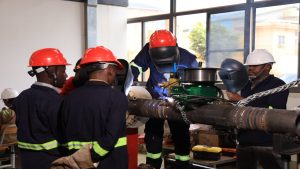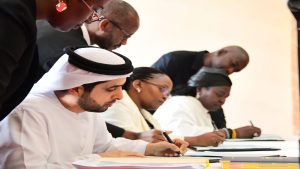Share
In an effort to bolster the country’s petroleum reserves and develop its infrastructure for oil production, the government has declared the opening of three additional frontier basins for petroleum exploration.
These recently identified regions—the Lake Kyoga Basin (7,831 km2), Hoima Basin (3,741 km2), and Moroto-Kadam Basin (5,672 km2)—represent a major step toward thorough exploration and could improve the economic feasibility of Uganda’s oil industry.
Uganda will start a domestic gold buying program.
Sidronius Okasaai Opolot, Minister of State for Energy, urged the public to participate by reading and offering feedback on the environmental and social impact assessments for each basin during a news conference at the Ministry of Energy headquarters in Kampala.
Opolot emphasized the government’s dedication to openness and inclusive decision-making in resource management by saying, “I call upon the public to access and study the Impact Assessment reports for the Moroto-Kadam, Lake Kyoga, and Hoima basins, and to share informed views within the statutory ninety days following this announcement.”
This was reaffirmed by Assistant Commissioner of Exploration Frank Mugisha, who also mentioned that the Ministry of Energy and Mineral Development would be used to collect public input.
“The government is taking proactive steps to address the anticipated risks of petroleum shortages as existing infrastructure ages,” he explained, highlighting the significance of these new basins to Uganda’s long-term petroleum policy.
This includes opening new frontier basins for more resource exploitation and granting licenses to businesses for greater exploration.
Uganda’s long-term policy objectives for sustainable resource management are in line with this expansion. The government has been working with international partners to commercialize oil resources through in-country refining, crude oil exports, and power generation since awarding nine petroleum production licenses to foreign oil corporations in the Albertine Graben in 2012 and 2016.
By connecting this project to Uganda’s National Oil and Gas Policy (2008) and related laws, such as the Petroleum (Exploration, Development, and Production) Act (2013), Opolot emphasized the significance of sustainable development.
He reiterated that “the sustainable exploitation, commercialization, and utilization of Uganda’s petroleum resources will remain our top priority,” referring to the legal frameworks intended to control the effects on the environment and society.
“The opening of these new basins in Uganda presents a critical opportunity to fortify the nation’s petroleum industry,” Mugisha said.
“Uganda wants to optimize the economic benefits of its oil sector while prioritizing responsible and sustainable resource management through public engagement and strict adherence to environmental safeguards.”
In order to ensure that a variety of viewpoints shape this new stage in Uganda’s petroleum exploration adventure, the government is encouraging residents to actively participate by reading the impact assessments and offering input within the 90-day consultation period.
This all-encompassing strategy reaffirms Uganda’s dedication to striking a balance between social and environmental responsibility and economic prosperity.









